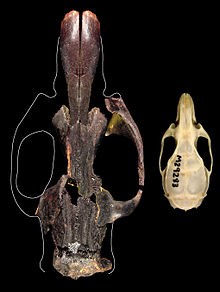Coryphomys
| Coryphomys Temporal range: Holocene
| |
|---|---|

| |
| The skull of a black rat (right) compared with a fairly complete skull of a specimen of the extinct Coryphomys musseri (left). | |
| Scientific classification | |
| Domain: | Eukaryota |
| Kingdom: | Animalia |
| Phylum: | Chordata |
| Class: | Mammalia |
| Order: | Rodentia |
| Family: | Muridae |
| Subfamily: | Murinae |
| Genus: | †Coryphomys Schaub, 1937 |
| Species | |
| |
Coryphomys is an
" or "summit mouse".Species include Coryphomys buhleri and Coryphomys musseri.[1] Archaeological research on East Timor has revealed the bones of rats weighing up to 6 kilograms (13.2 pounds) when adult[citation needed]. They seem to have died out between 1000 and 2000 years ago, perhaps due to large-scale forest clearance for farming.
In 2015, the discovery of fossils of "seven new species of giant rat", including the "largest rat ever" on the island of East Timor was announced. The biggest of these rats was described as weighing "five kilos (11 pounds), the size of a small dog," and was referred to as the "Giant Rat" in news stories.[2]
References
External links
- https://web.archive.org/web/20100729135507/http://io9.com/5596239/2000+year+old-giant-rat-was-forty-times-bigger-than-its-modern-relatives
- Archaeologists Discover Biggest Rat That Ever Lived: Weight of About 6 Kilograms (Over 13 Lb)
- http://news.discovery.com/animals/giant-rat-fossil-discovered.html
- http://www.neatorama.com/2010/07/26/skeleton-of-giant-rat-discovered/
